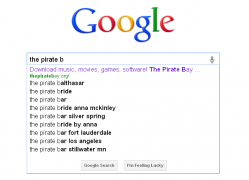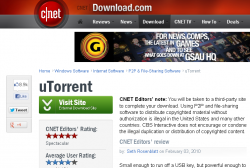I’m back from holidays! I would say I feel recharged, but after a week of catching up on work (got back on Monday), my batteries are edging towards the “please connect your charger” level again.
There’s lots to go through, so let’s get started!
![]()
It’s not surprising at all to say that the MPAA doesn’t like Google. But even I was surprised at the level of animosity between Hollywood and the world’s most popular search engine, based on the MPAA attack plans that Google has now managed to obtain (via their lawsuit against Mississippi Attorney General Jim Hood). The PR blitz included a Today show segment, ad editorial in the Wall Street Journal warning of a piracy induced share price crash, and even getting a major Google shareholder to come out and attack the company’s lack of action on tackling the piracy problem. All prongs in the attack would then reinforce each other to give the appearance that there’s a serious problem with Google, a problem that Google does not want to address.
Except of course, Google is addressing the piracy problem, and doing it at an amazing rate of 18 link take-downs per second. It’s apparently still not fast enough for Hollywood.
This is the kind of well orchestrated lobbying campaign that the MPAA are well known for. If only they devoted their energy and expertise to, I don’t know, actually tackling the reasons behind piracy (lack of availability, lack of user friendliness and perceived lack of value), maybe they don’t need Google to take down more than 18 links every second to stay in business (although business these days seems to be doing pretty well).
Not to be outdone by Hollywood, the music industry is also launching renewed attacks on another well known web entity. The RIAA accuses CBS owned CNET/Download.com of providing downloads for tools that helps users pirate music. Specifically, the RIAA says that Download.com hosts YouTube rippers and other video soundtrack rippers, which can be used to rip the music from legally uploaded music videos.
This, the RIAA says, is simply not permissible, because it would allow users to use content in a way the music industry did not intend them to use. Imagine playing a music video, but with your eyes closed – this was not how the recording industry intended you to use the music video, and therefore, it’s just not on!
But seriously, YouTube and other online videos are not protected by DRM (something the RIAA may want to do something about in the future), and so ripping the audio from them is trivial. And even if there was some way to protect the audio track from being ripped, users can always use the tried and tested method of “home taping” (it’s the method that “nearly” killed off music, once upon a time)that they’ve been using since the day of cassette tapes (ask your parents if you don’t know what they are).
But I have to ask, just how much money is the music industry actually losing to YouTube ripping? From the way the RIAA is acting, it does seem like they’re losing an arm and a leg (and other body parts) to the problem, as otherwise why would they bother CNET/Download.com again when they’ve already lost a court case against them over LimeWire and BitTorrent software? This anti-piracy ad campaign by Universal Music, used in Brazil in 2007, provides some insight into how the recording industry views the piracy problem (although one could argue that it’s the record companies are that liberally, but figuratively of course, taking body parts from actual musicians when it comes to money earned from recorded music).
I can’t find the news story now, but I read somewhere that a recent number one recorded hit had the lowest earnings ever. This does seem to suggest that piracy may be having an effect on revenue, but the revenue model for the music industry has changed drastically since the introduction of digital singles (for the worse for them, but better for consumers), any effect piracy might be insignificant compared to this sea change. Change sometimes isn’t good, or at least not good for everyone, and it’s not always easy or possible to adapt. Just ask Blockbusters and Columbia House!
![]()
Just when you thought the next-gen codec wars was settled, with HEVC being crowned the winner, along comes another contender, perhaps from an unexpected source. Cisco is very well known for being big in networking, but for video codecs, it’s not one company you would naturally think of. But that may change soon, with the company announcing they’re working on a new next-gen codec to compete with HEVC/H.265 – and best of all, it will be open source and royalty free.
Now, admittedly, we’ve been here before with Google’s VP9 – and if Google with their YouTube and Android can’t get their own codec to be a viable alternative to HEVC, then things are going to be doubly difficult for Cisco. However, Cisco is working with the Internet Engineering Task Force (IETF) and their NetVC workgroup, and seem to be following a process that will lead to more community involvement than the process Google went with. So there’s a hope that something more solid, and less tied to the efforts of one particular company (Google), might emerge from all of this and become a true viable open source, royalty free alternative. Fingers crossed.
——
Actually, that wasn’t as much news as I thought. There’s more for Australians streaming fans over at Streambly though. There will be more next week, of course. See you then!




